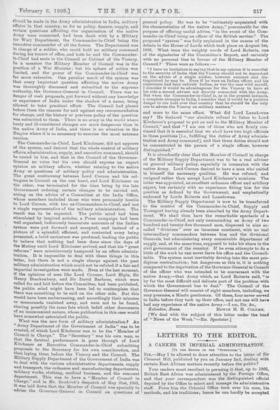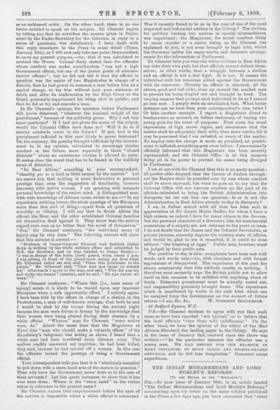LETTERS TO THE EDITOR.
A CANKER IN IMPERIAL ADMINISTRATION. [To ME Emma OF THU "SPECTATOR:1 Sift,—May I be allowed to draw attention to the letter of Sir Clement Hill, published by you on January 2nd, dealing with certain East African matters recently before the public ?
Your readers must recollect in perusing it that, up to 1905, British East Africa was administered by the Foreign Office, and that your correspondent was the distinguished official deputed by the Office to select and manage its administrative staff. From him the Colonial Office took over his men, his methods, and his traditions; hence he can hardly be accepted
as an unbiassed critic. On the other hand, there is no one better entitled to speak on the subject. Sir Clement begins by telling you that he considers the answer given in Parlia- ment by the Under-Secretary for the Colonies, in reply to a
series of questions, was satisfactory. I have dealt with this reply elsewhere in the Press in some detail (Times,
January 18th), so I will now only take one point, there omitted, to serve my present purpose,—viz., that it was calculated to mislead the House. Colonel Seely stated that the offender whose conduct was under consideration "was not a high Government official, but one of the junior grade of adminis- trative officers" ; but he did not tell it that the official in question was the senior of two Magistrates in charge of a district, that he had power to summon a man before him on a capital charge, to try him without jury, pass sentence of death, and, after its confirmation by the High Court at the Coast, personally superintend his being shot in public; and that he did so try and execute a man.
In Sir Clement's opinion, the sentence before Parliament will prove deterrent, "whatever the nominal weight of the punishment," because of the publicity given. May I ask him 110/11O questions ? If I had not given the name of the culprit, would the Colonial Office have done so ? Will it do so if similar misdeeds occur in the future P If not, bow is the punishment inflicted in this case likely to prove deterrent? On the contrary, the penalty thought sufficient by the Govern- ment is, in my opinion, calculated to encourage similar conduct in the future, more especially in those "closed districts" where no unwelcome civilian is allowed to enter. It makes clear the worst that has to be feared in the unlikely
event of detection.
"In East Africa," according to your correspondent,
"chastity per se is held in little esteem by the natives." Let me assure him that nothing is more destructive to personal prestige than even the suggestion of familiarity, however innocent, with native women. I am speaking with intimate personal knowledge of the native mind. A distinguished man, with wide knowledge of African races, writes to me :—" In my experience, nothing lowers the whole prestige of the European more than this sort of thing,—apart from all questions of morality or villainy. I will say that in South Africa the official, the Boer, and the older established Colonial families set themselves dead against it. They know that the natives
regard such men as no better than the worst of themselves." "But," Sir Clement continues, "the individual sense of injury may be very keen." The following extract will show that this surmise is correct :—
"Evidence of Lance-Corporal Shomasi wad Saddula (taken down in writing by the white military officer and submitted to HE. the Governor, and by him handed to Judge Barth) :— was in charge of the home (fort) guard, when about 6 p.m. I was sitting in front of the guard-room eating my food when Mr. Silberrad called me and said, "Place this policeman in the prison." MT. Silberrad said, "Tame NAN HAS TRIED TO STRIKE me." Afterwards I spoke to the man, and said, "Why did you try and strike the bwana" (master), and he said, "Ha HAS TAMEN Mr Sir Clement continues : "Where this [i.e., keen sense of injury] exists it is likely to be vented upon any innocent European when a safe opportunity offers." I entirely agree. 1 have been told by the officer in charge of a station in the Protectorate, a man of well-known courage, that both he and I would be shot by the troops during the current night because the men were driven to frenzy by the knowledge that their women were being abused during their absence by a white official. "Whence," says Sir Clement, "come native wars, &c." About the same time that the Magistrate at Nyeri (the "man who should make a valuable officer" of his
Excellency's telegram) was eating as above, I heard that a white man had been murdered some distance away. The
natives readily answered my inquiries ; he had been killed, they said, because he bad carried off a woman. In this ease
Lime offender lacked the prestige of being a Government official.
Your correspondent tells you that it is "absolutely essential to put down with a stern hand acts of the nature in question." Then why have the Government never done so in the ease of their servants P Let him quote instances to show that it has
ever been done. Where is the "stern band" in the action taken in reference to the present cases P Sir Clement argues that imprisonment before the eyes of the natives is impossible where a white official is concerned. Was it recently found to be so in the case of one of the most respected and influential settlers in the Colony P The civilian, for publicly beating two natives in special circumstances, was imprisoned ; the Magistrate, for secret conduct likely to cause murder or a native rising, as Sir Clement has explained to you, is not even brought to legal trial, whilst the Governor cables his many merits and domestic arrange- ments for the information of Parliament.
Sir Clement tells you that the white civilians in East Africa can take their own part, but that officials cannot defend them- selves; in other words, that a struggle between a civilian and an official is not a fair fight. It is not. It means the individual with his resources pitted against the Government with its resources. Directly an official is attacked, all the others, good and had alike, close up around the marked man to prevent his being singled out and brought to book. The varying reasons that prompt each individual to do so I cannot go into now. I simply state an established fact. What better instance can we have than your correspondent's own letter ? Or take another example. I report a Magistrate direot to headquarters as accused, on fullest testimony, of buying two young girls for the worst of purposes. First come the usual expressions of high moral regret, and assurances that the matter shall be adequately dealt with; then more words; till it may be presumed that I am satisfied, or weary of the matter. No inquiry into the charge is made as promised, no punish- ment is inflicted, everything goes on as before. I am eventually officially informed that this Magistrate has been severely reprimanded, and the Colonial Office is at this moment doing all in its power to prevent his name being divulged in Parliament.
I am at one with Sir Clement that this is no party question : all parties alike demand that the Courts of Justice through- out the Empire shall be presided over by men whose conduct shall be above reproach, but when he goes on to say that the Colonial Office will not tolerate conduct on the part of its officials calculated to bring the British Administration into disrepute, let me ask him one question: Is or is not the Administration in East Africa already to-day in disrepute I am in fullest accord with all that has been said in appreciation of Sir James Hayes Sadler, for whom I have a high esteem, as indeed I have for many others in the Service, but the personal character of a Governor, like the matrimonial connexions of a culprit, are not relevant to the point at issue. I do not doubt that Sir James and the Colonial Secretaries, as private persons, sincerely deplore the existing state of affairs, and would be glad to see it remedied, if it could he done without "the breaking of eggs." Public men, however, must be judged by their public acts.
The position to-day is this: complaints have been met with words, and words only,—i.e., with circulars and with formal expressions of disapproval. The experience of the past has shown conclusively that this attitude results in nothing. I therefore most earnestly urge the British public not to allow itself on this occasion to be satisfied with anything short of deeds. Deterrent punishment must he actually meted out, and responsibility genuinely brought home. The repentance which is manifested by works is the only kind which can be accepted from the Government as the earnest of future reform.—I am, Sir, &c., W. SCORESBY ROUTLEDGE„ 36 Bedford Spare, W.C.
P.5.—Sir Clement declines to agree with you that such cases as have been reported "are typical," or to believe that the local officials "view them with indifference." On the other hand, we have the opinion of the editor of the East African Standard, the leading paper in the Colony. ' He says in the issue of January 2nd, received since the above was written :—" In the particular instance the offender was a young man. HE HAD BEFORE HIM THE EXAMPLE, IN MANY INSTANCES, OF MUCH OLDER AND HIGHER-GRADED OFFICIALS, and he fell into temptation." Comment seems superfluous.










































 Previous page
Previous page